My Traditional Delight: Editan Soup
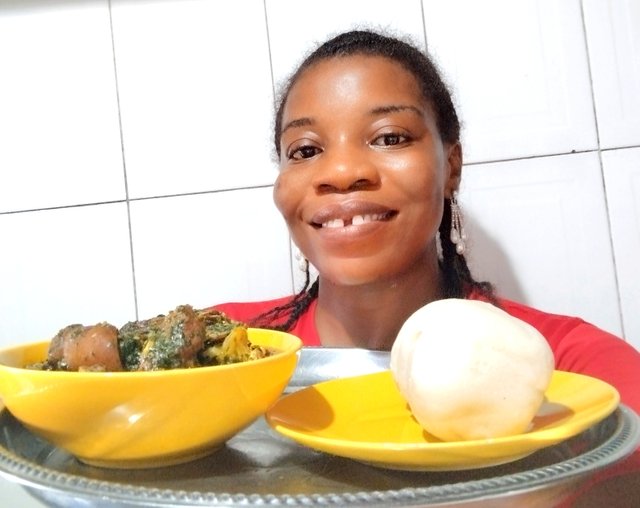
Hi Friends!
I hope your week is going well. Mine is simply amazing, and today, I want to share with you one of my traditional dishes, which holds a special place in my heart. This dish is not just a meal; it is our culinary heritage, our culture, and our family; oh, you may wonder what dish it is; okay, it's none other than Editan Soup! This soup is among our culinary treasures; I mean dishes like Ekpang Nkuwuo, Afang Soup, Edikang Ikong and Afia efere, etc. Each time I prepare this soup, I'm normally transported back to my childhood days, when my siblings and I were busy helping my mom in the kitchen, and the aroma of this soup will filled our lovely home, uniting us in Shared love and laughter.
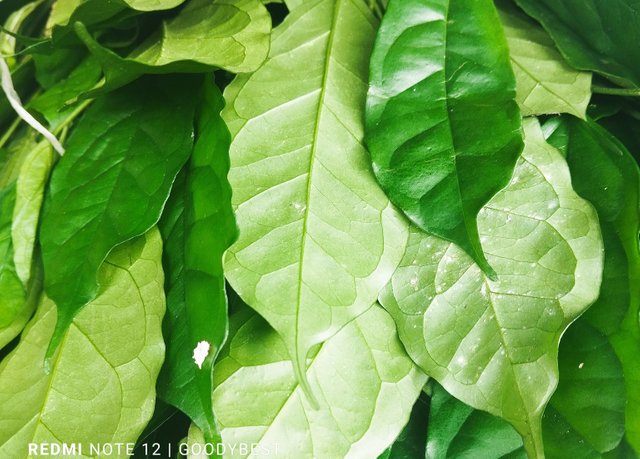
You know this soup is the Indigenous food of Ibibio and Efik people of south-south Nigeria (precisely Akwa Ibom and Cross River state), and as a real Ibibio lady, I often made this delightful and nutritious soup with the flavorful Editan leaves. The scientific name for these dark green leaves is Gnetum africanum; this leaf is a powerhouse of Vitamins and minerals, which makes the dish not only delicious but healthy! The process of preparing this traditional delight is a bit complicated and detailed, yet I never mind, because it represents the warmth of traditional cooking passed down from generation to generation, often guided by the hands of our dear mothers and grandmothers.
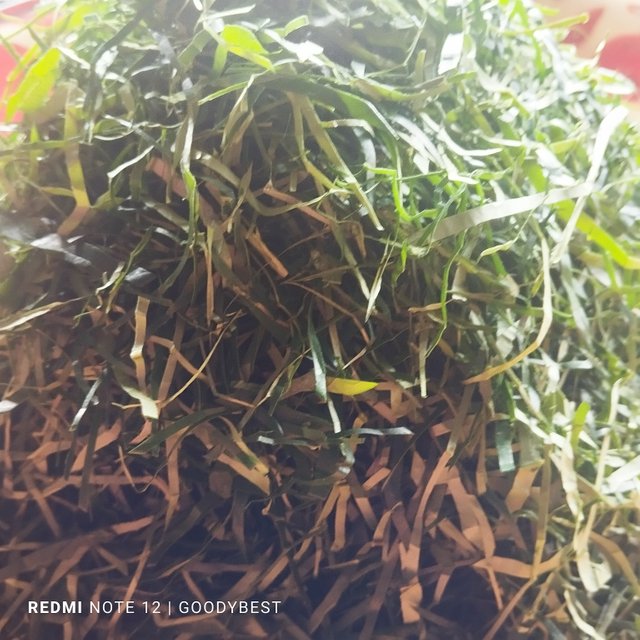 | 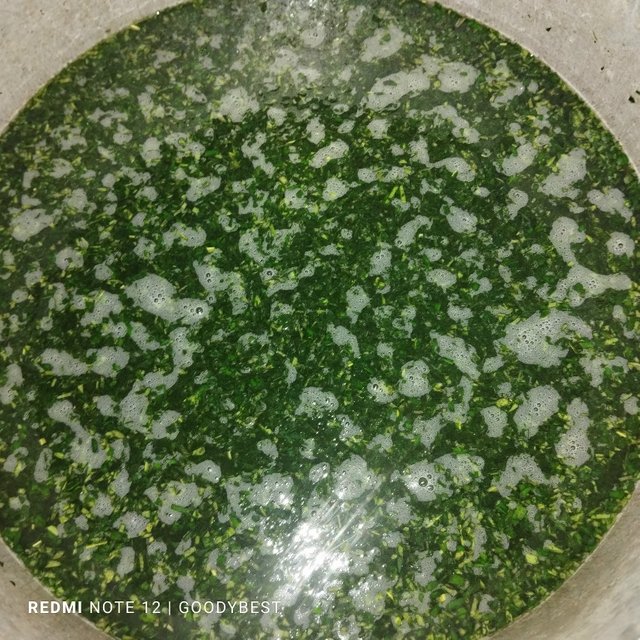 |
|---|
The preparation of this scrumptious dish starts with the sourcing of fresh Editan leaves, which are meticulously sliced, pounded, and washed; yes, because it's very bitter, so you need to wash out some bitterness and set aside. The leaf is the star ingredient, but the supporting cast like stockfish, dry fish Kanda, crayfish, goat meat, and periwinkles, just to mention a few, is equally very important, haha.
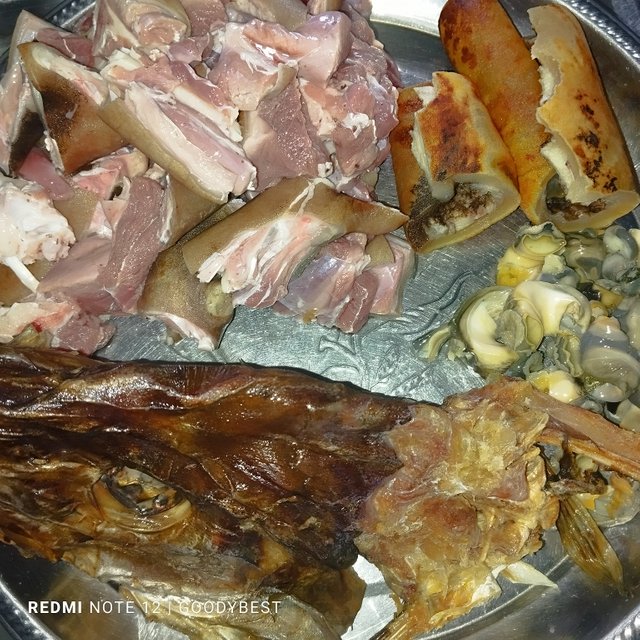
Traditionally, Editan Soup features a variety of proteins, including fish, meat, cowskin, snails, stock fish, periwinkles, and water leaves. These ingredients often depend on regional preferences and available resources. For my family, I would typically use goat meat and stockfish, Dry fish, periwinkles, oysters, crayfish, etc, both contributing to the soup's rich, savory profile.
Let's get to cooking, so I begin with the washing and cooking of my goat meat, Kanda (cow skin), and snails with a medley of spices, including pepper, salt, onions, and seasoning cubes, until it's tender. Also, I wash my stockfish seasoning it with salt, seasoning cubes, pepper, and palm oil.
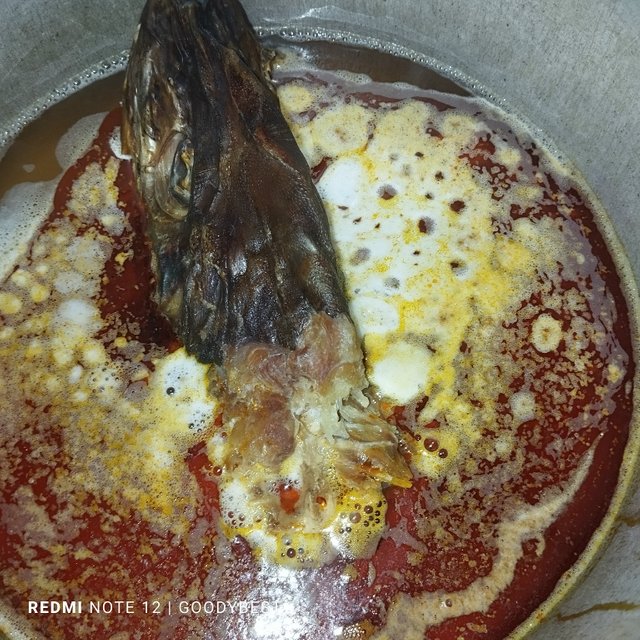
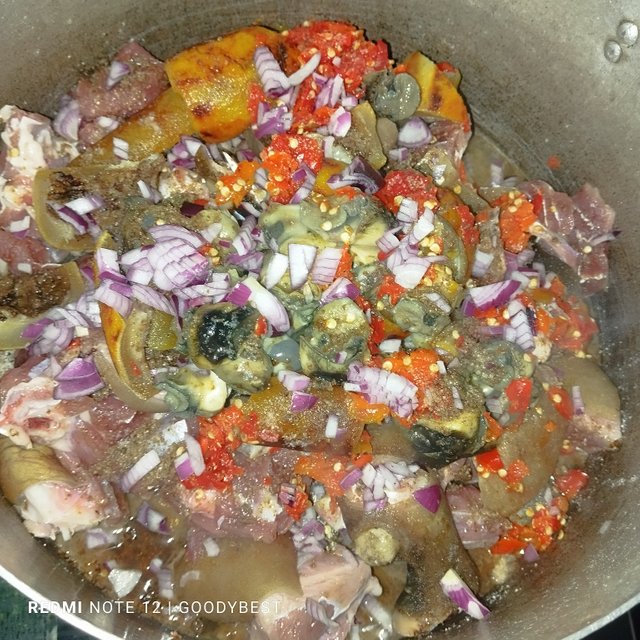
The resulting broth spread through with deep flavors that form the foundation for my Editan soup. Ahh as the meat simmers, I eagerly await the magic that is about to happen in a few minutes. Ahh the aroma and vapor wafting through the kitchen make my kids run to the kitchen asking me what I'm preparing for them, that they're smelling something nice, hahaha 😂 it is always a signal of the warmth and comfort to come.
Next, I wash and slice the water leaves and set them aside; the botanical name for water leaves is talinum triangulare. It is a rich source of protein and vitamins, and it has anti-inflammatory, anti-fungal, and anti-bacterial properties. It can delay the disease of the heart, so it's a very good leaf. Next, I wash my periwinkles and add in the stockfish broth.
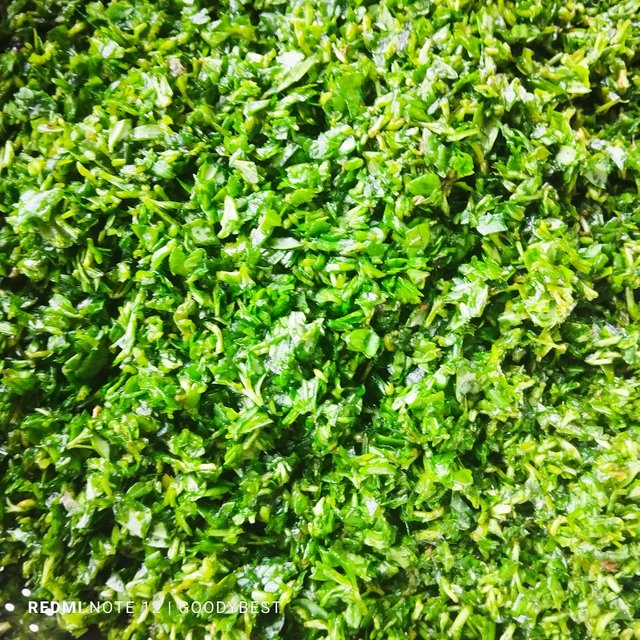
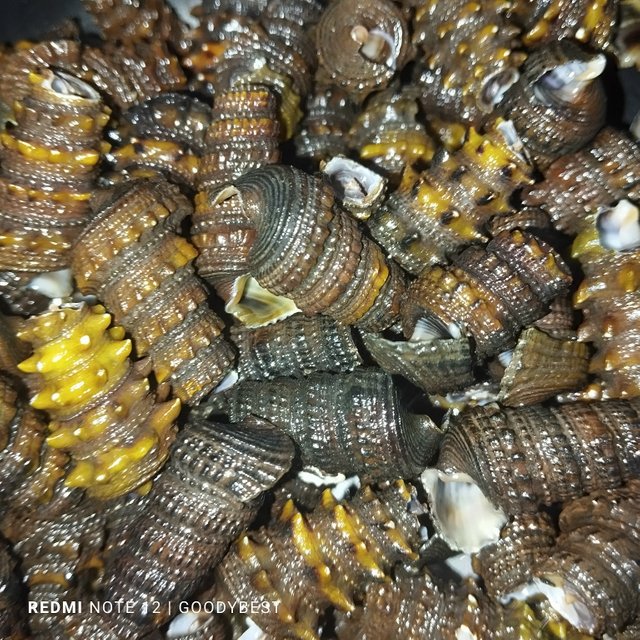
The next step is the transformative one: yes I added ground crayfish, dry fish, and palm oil. These ingredients enrich my soup with savoriness and a great color that makes it enticing. Once the pot was simmering for some minutes, I added the sliced water leaves. I let the leaves wilt slightly so that their bright green color and nutritional value can be retained.
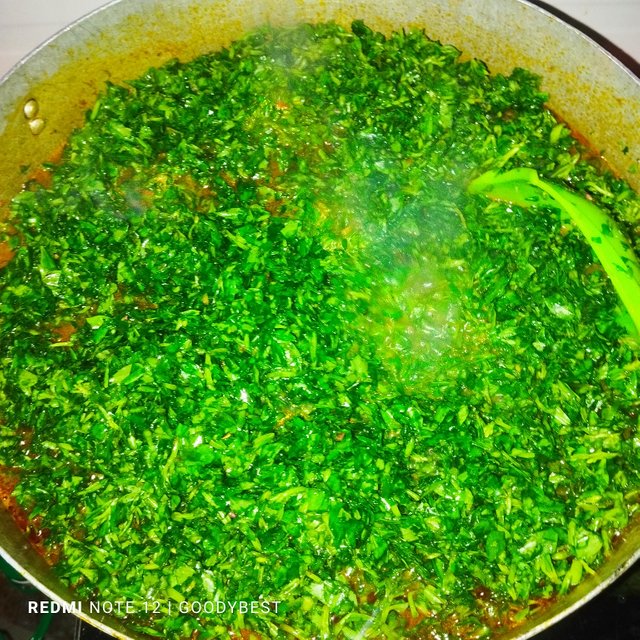
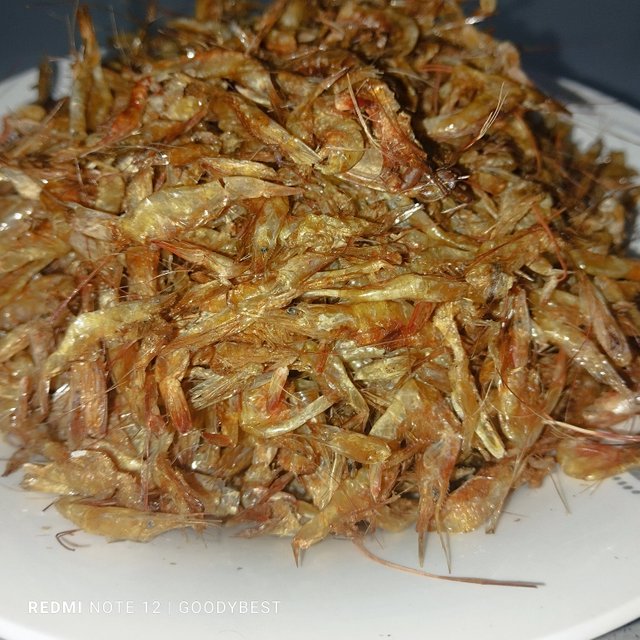
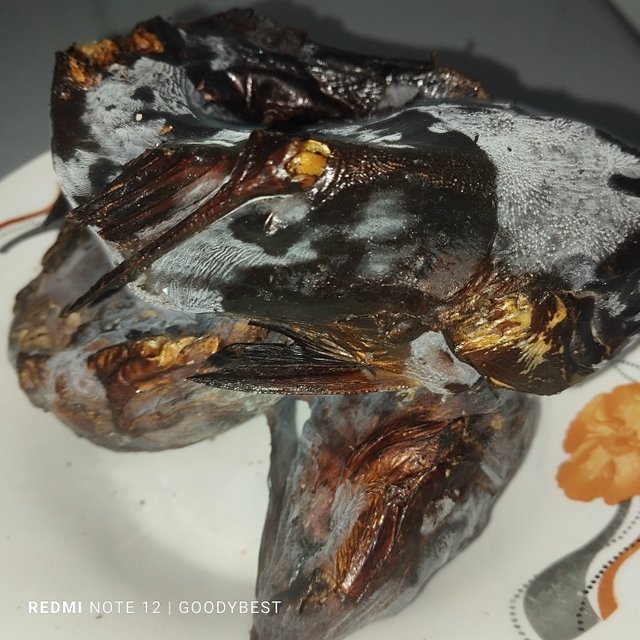
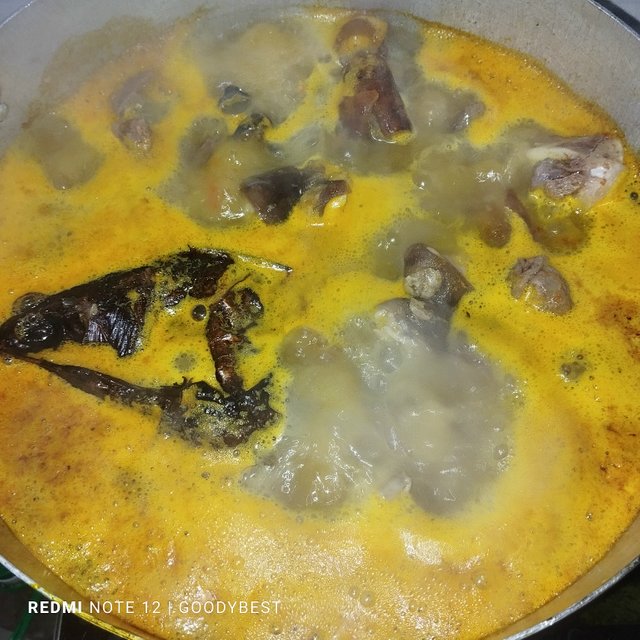
And finally, I added my star ingredient, the shredded Editan leaves, and sliced onions, and I also added some assorted meats to ensure a delightful mix of textures and flavors. Boom, boom, my Delightful Soup was ready to be devoured!
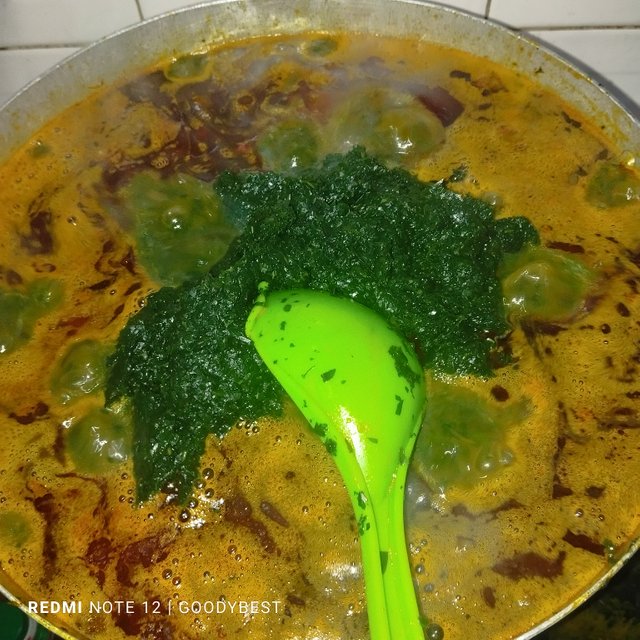
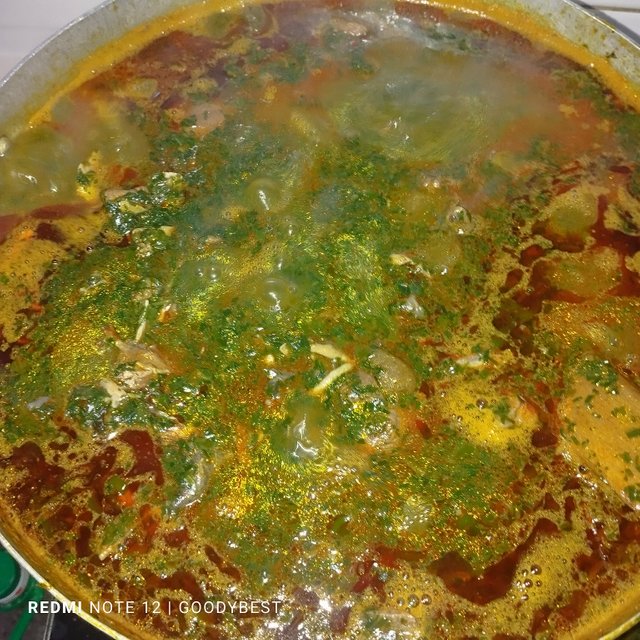
Editan soup is best enjoyed with Fufu, Garri, pounded yam, or rice; it usually creates a satisfying and fulfilling dining experience. Taking it as a dinner was a communal affair that evening, haha 😂 we gathered around the table, sharing stories and laughter while enjoying the delicious soup, and we enjoyed the undeniable bond that comes with sharing a home-cooked meal.
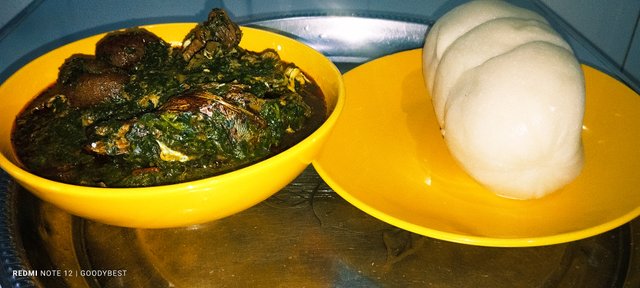
Beyond the rich flavors of Editan soup, it is our culinary heritage, and I cherish it because it signifies culture, especially during traditional occasions, like traditional Marriage ceremonies. We used to serve Editan Soup among the dishes given to the groom's family (Ndidia Ibenge asen) as a welcome meal. The process of cooking this soup has always been a labor of love because it's intricate, it takes a lot of time and energy, but for me, it's a way of keeping our heritage alive and sharing a piece of our culture with my kids and loved ones.

In conclusion, Editan Soup is more than just a dish; it's indeed a symbol of my traditional delight. Every taste, every swallow has a story to tell, a true testament to heritage and culture, family values and community, and the essence of preserving our culinary heritage. As I share this delightful soup with my family I know that I am not only feeding them a delicious and nutritious meal, but I am nurturing their souls with warmth, love, and cherished memories!
Your meal looks amazing Ma, the bond that comes with eating together is undeniably the best.
Thanks for sharing your amazing recipe
It's a pleasure dear, and thanks for the compliment, I hope you will try it out someday
Hello ma',
You traditional meal looks soo delicious, I would really love to try it out 😋
Upvoted. Thank You for sending some of your rewards to @null. It will make Steem stronger.
Ohhh myyy. These all look very yummy😋
You can say it again!
I appreciate your support @vivigibelis
People in each region have their own preferred cuisine, which is also a reflection of the Earth's diversity.
Absolutely! Variety is what makes life interesting, they say!